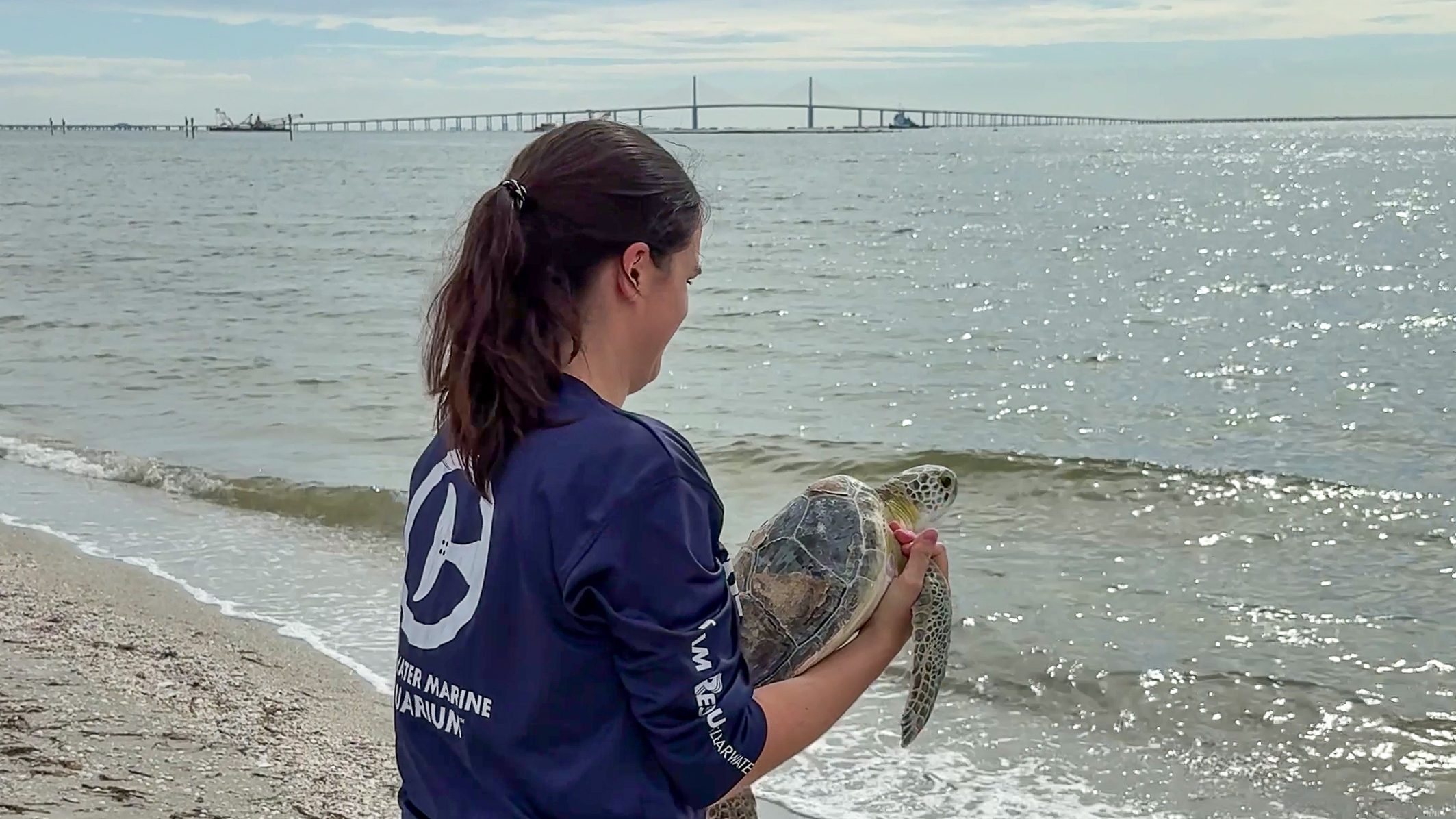Clearwater Marine Aquarium staff and volunteers work each day to rescue marine life and provide the most advanced and effective care to maximize the opportunity to return sick or injured animals to their homes. The animals that come through our doors arrive because they are suffering from an illness or severe injury. Many of our animals are found by local residents, fishermen, park rangers or even visitors to the area.
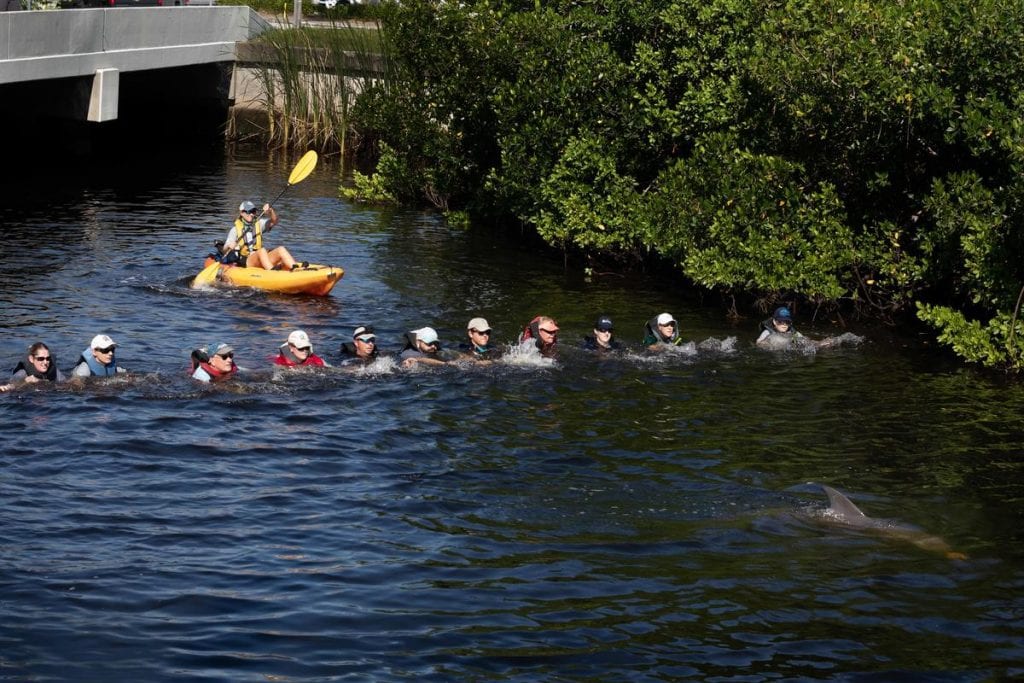
Rescue
Clearwater Marine Aquarium’s (CMA) rescue team responds to sick, injured and deceased marine animals reported along the west coast of Florida in the Pinellas, Hillsborough, Hernando, Pasco, Citrus and Levy counties. The rescue and response team is composed of specially trained personnel, including staff biologists, interns and volunteers. CMA coordinates with the National Oceanographic and Atmospheric Administration (NOAA), as well as collaborating with local marine life rescue organizations to provide a quick and efficient response to ensure the proper treatment and transportation of all distressed marine life. Our veterinarians, staff biologist, interns and volunteers work together to provide the utmost care, but you can also be a vital asset to our team by reporting an animal in distress, as well as supporting our rescue efforts through donations.
Rescue Team
CMA’s rescue team is composed of a variety of trained personnel, including staff biologists, interns and volunteers.
Responses
The CMA rescue team responds to a variety of marine animals, including cetaceans (dolphins, whales, porpoises), sea turtles, manatees, and North American river otters. The team often collaborates with other departments and local organizations, such as assisting CMA’s Sea Turtle Rehabilitation Department upon live sea turtle intakes, as well as the Florida Fish and Wildlife Conservation Commission (FWC) with manatee rescues, verification of mating herds and monitoring manatees potentially in distress. Owl’s Nest Sanctuary for Wildlife is another facility the team collaborates with by compiling and forwarding information regarding injured birds.
Rescue personnel also respond to deceased cetaceans and sea turtles. By participating in post-mortem examinations with a partnering facility, information regarding life history, cause of death and signs of human interaction may be investigated.
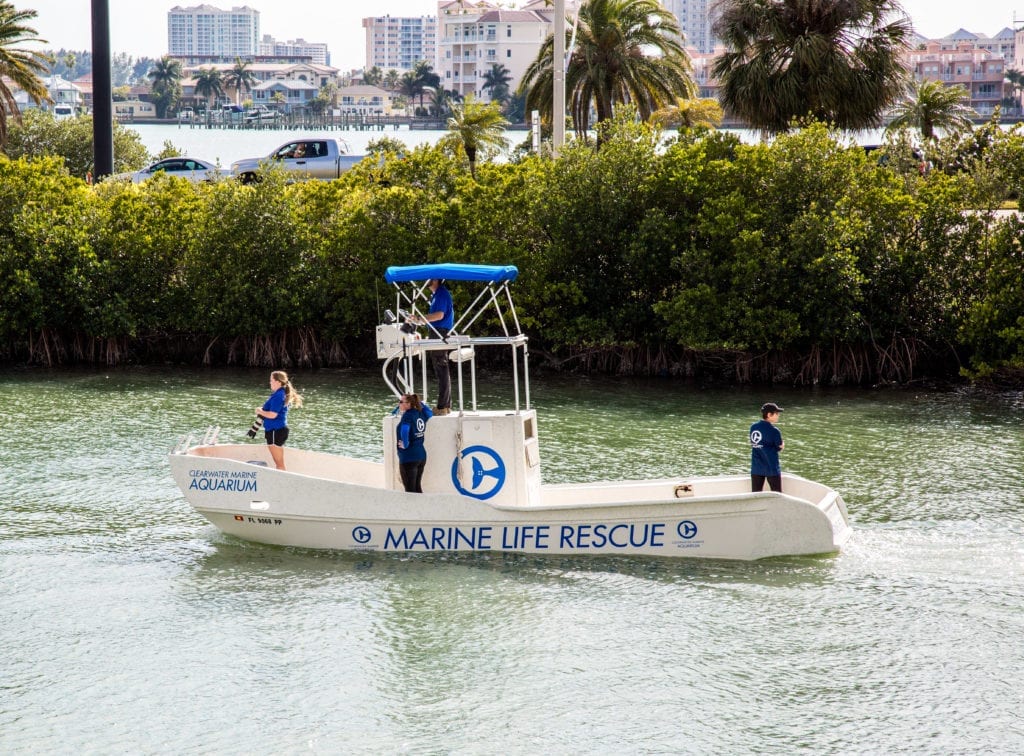
Vehicles and Vessels
A variety of vehicles and vessels are used by the rescue team to enhance the method of response as well as decrease response time. The main vehicle of operation, the stranding transport truck (converted F450 box truck), is used to accommodate larger animals. The vehicle is equipped with all necessary supplies, including a stretcher, water sprayers, towels and more, which will assist in the transport of live and deceased cetaceans. This stranding transport truck is a John H. Prescott funded project.
The team also utilizes an F250 truck, grant funded by the National Fish and Wildlife Foundation (NFWF), which may be used for smaller live and deceased cetaceans. Equipped with an EZY lift system, this mechanism assists responders transporting larger animals into the bed of the truck.
Rescue. Rehab. Release.
Watch our Rescue & Rehab Teams in action as they rescue, rehab and release marine animals.
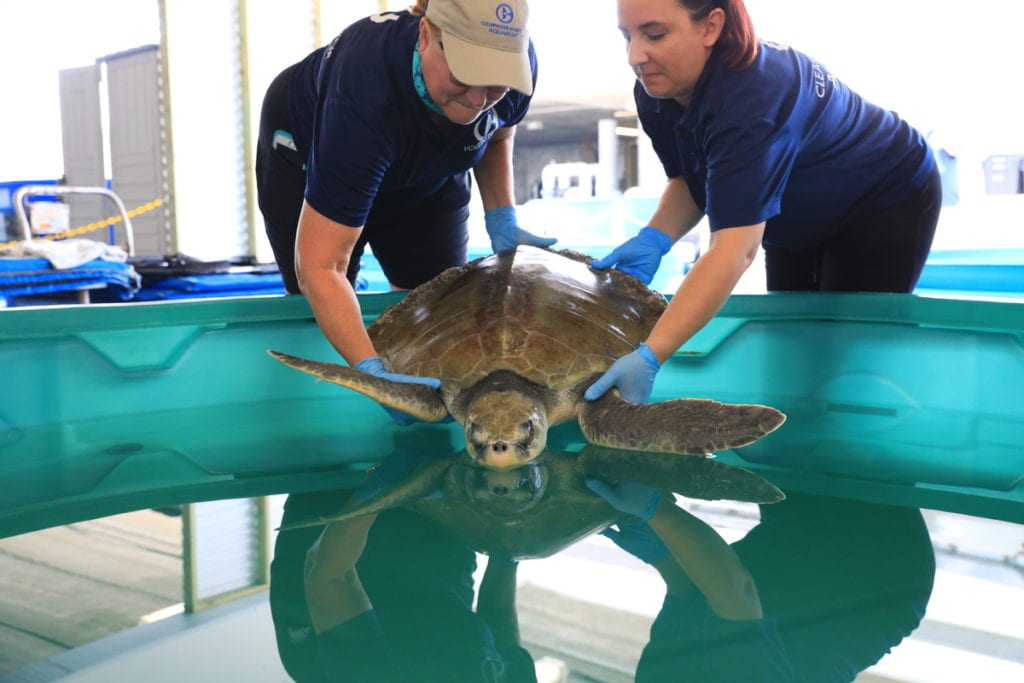
Animal Rehab & Hospital
You’ll see a number of rescued animals currently undergoing rehabilitation in our marine animal hospital. A majority of these animals are sea turtles. They may be suffering from various issues, including buoyancy disorders, cold stun symptoms, fibropapilloma tumors and boat strike or entanglement injuries. Our permanent resident animals also routinely receive medical care and treatments from the animal hospital. We have full-time veterinarians and vet techs to care for all of our animals.
Our sea turtle rehab center is one of only six facilities in Florida that treat sea turtles with the fibropapilloma virus in our ICU. This virus causes the growth of tumors that can be removed surgically with variable success for regrowth.
Current Animal Hospital Patients
Support Our Animal Care Fund
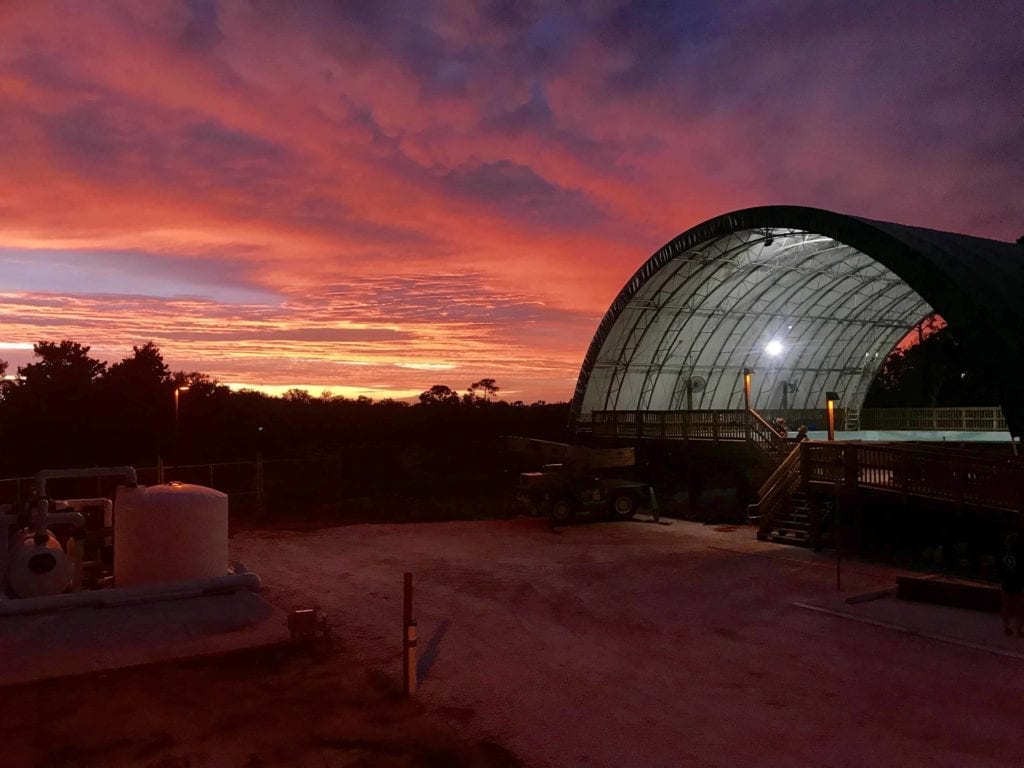
Marine Mammal Stranding Station at Fred Howard Park
Clearwater Marine Aquarium’s new marine mammal stranding station became operational following the stranding of five pilot whales off Redington Beach on July 29, 2019, a few weeks after the first section of the site was completed and ready to receive animals. The facility is located inside of Fred Howard Park on the coast of Tarpon Springs with land provided by Pinellas County and the city.
This location is not open to the public and is only intended for the rehabilitation and short-term care of stranded marine animals, focusing on small whales and dolphins initially.
The facility’s open-air 75,000-gallon holding pool measures 40 feet across and is surrounded by a wood deck for access and observation. This location provides CMA’s Rescue Team an offsite stranding station, which is well-positioned in our jurisdiction zone, to bring rescued marine animals for care without impacting the resident animals and regular operations at Clearwater Marine Aquarium. This secluded and private site inside the coastal park will also reduce the exposure to people and noise for these rescued animals before they are returned to the wild.
Stranding response was conducted under a stranding agreement between NOAA Fisheries and CMA under the authority of the Marine Mammal Protection Act.
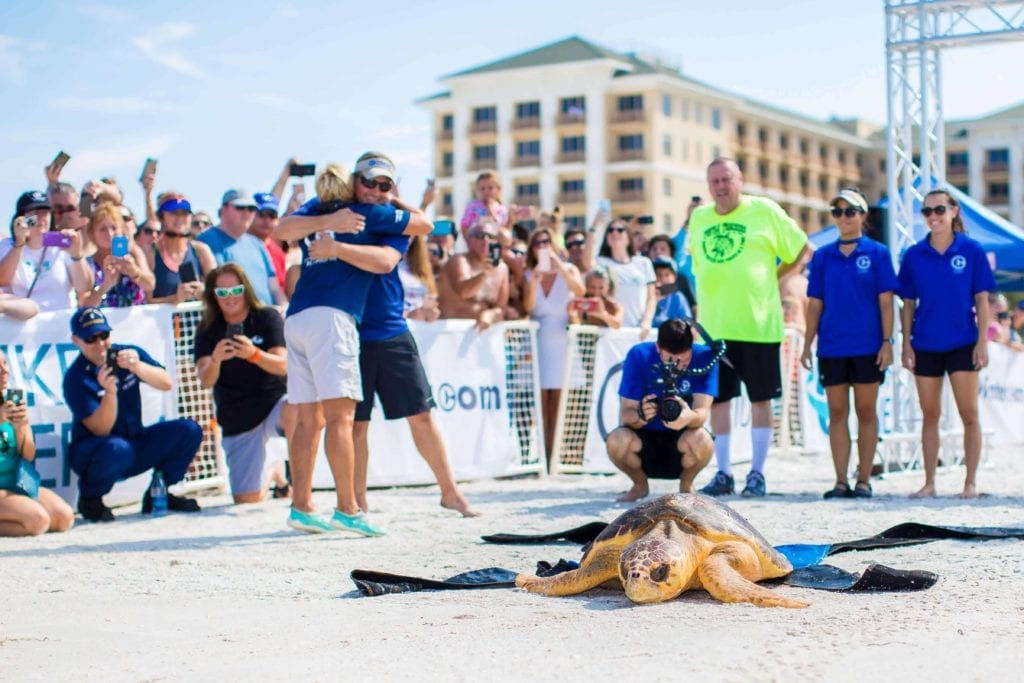
Release into the Wild
Once an animal arrives at our hospital, a team of experienced CMA staff biologists, veterinarians and volunteers create a rehabilitation plan specifically developed based on its injury or illness, with the goal of returning it to the wild. We also give every animal a name, as they have personalities just like we do. It is often hard to say goodbye to our new friends when they are successfully rehabbed; however, we feel so happy to be able to return them to their homes.
Released Animals
Making Waves
- 1600+ rescued sea turtles since 2010
- 2100+ Nests monitored since 2010
- 850+ Animals released since 2010
- 190K Volunteer Hours 2020-2021













